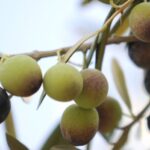Spekulatius, gingerbread, vanilla crescents – in supermarkets and discounters many types of Christmas cookies are currently tempting. But industrially manufactured pastries contain palm fat and cheap substitutes instead of traditional ingredients, consumer advocates warn.
Anyone who bakes cookies or stollen at home usually uses butter or margarine. Industrial production is different: many Christmas biscuits contain palm fat or oil. Although the tropical vegetable fat is ecologically and health risky, it is used as a cheap substitute for butter. If you want to avoid it, you have to look carefully.
In a current market check, the Lower Saxony consumer advice center looked at 45 types of Christmas biscuits that, according to the list of ingredients, contain palm oil or fat. These included varieties such as speculoos, shortbread and vanilla kiperl, but also baked goods such as cinnamon stars and gingerbread, which actually do not require any fat. The criticism of consumer advocates: consumers do not expect that these pastries could contain palm oil. This is particularly annoying when advertising promises of quality such as “according to the original recipe”, “baked by a master craftsman” or “housewife style”, says Anneke von Reeken, nutrition expert at the consumer advice center in Lower Saxony.
Palm oil as an inexpensive butter substitute
The results show that palm fat is used in Christmas cookies as a cheap substitute for butter or as a cheap ingredient – even though it shouldn’t be there. The reasons: It is particularly inexpensive, tasteless and has special properties. Since it is solid at room temperature, palm oil can specifically influence the firmness and consistency of the food.
Ecologically and health hazardous
The downside: rainforest is still being cleared for palm oil plantations. Palm oil can also be harmful to health. “It contains fat pollutants that are classified as probably carcinogenic,” explains von Reeken. The critical substances are called 3-monochloropropanediol (3-MCPD) and glycidol. ÖKO-TEST recently verified these substances in the nut nougat cream test.
Tips for a palm oil-free Christmas
When shopping, look carefully at the ingredient list. This way you can avoid pastries with palm fat. By the way: Biscuits without palm fat are not necessarily more expensive than biscuits without.
Pay attention to the organic, fair trade or RSPO label, according to the advice of the consumer advice center. Then the palm oil was at least produced under environmentally friendly conditions.
Baking yourself is the best alternative!
Persipan instead of marzipan in pastries
Stollen, dominoes and other Christmas delicacies often contain cheap substitutes instead of high-quality ingredients, according to a study by the Schleswig-Holstein consumer advice center. Instead of marzipan (consists of almonds and sugar), the cheaper persipan is often used. Persipan tastes similar to marzipan, but is made from ground apricot or peach kernels. “The taste of persipan can pretend that it contains marzipan,” says Selvihan Koç, food expert at the Schleswig-Holstein consumer advice center.
An example: During a market check for dominoes from various manufacturers, the food experts discovered apricot kernels and persipan in eight out of nine products. If apricot kernels are specified in the list of ingredients, then there is usually perspian in the product.



